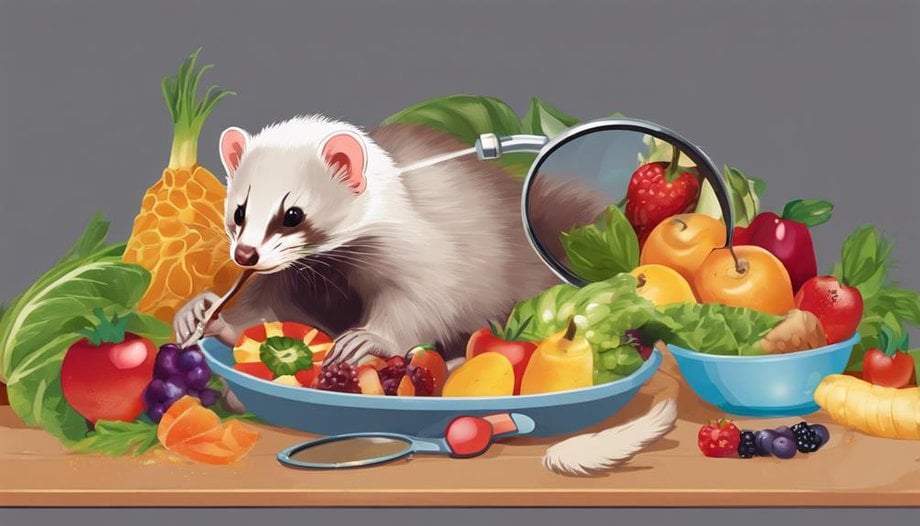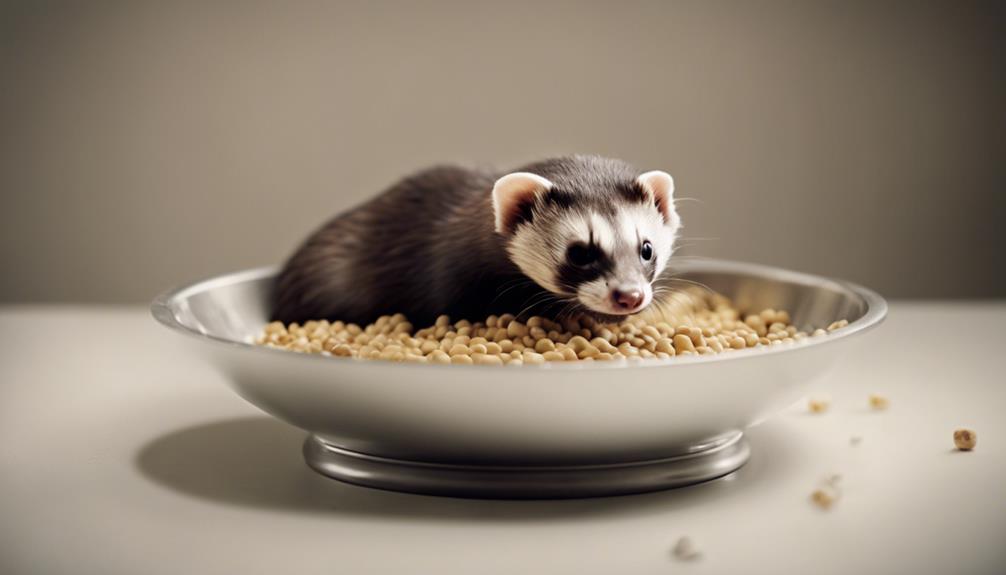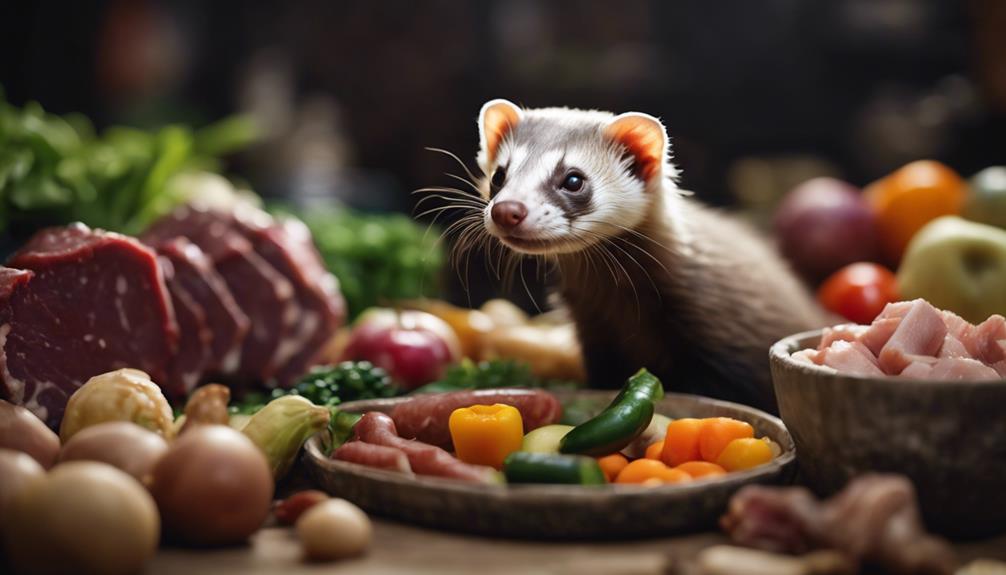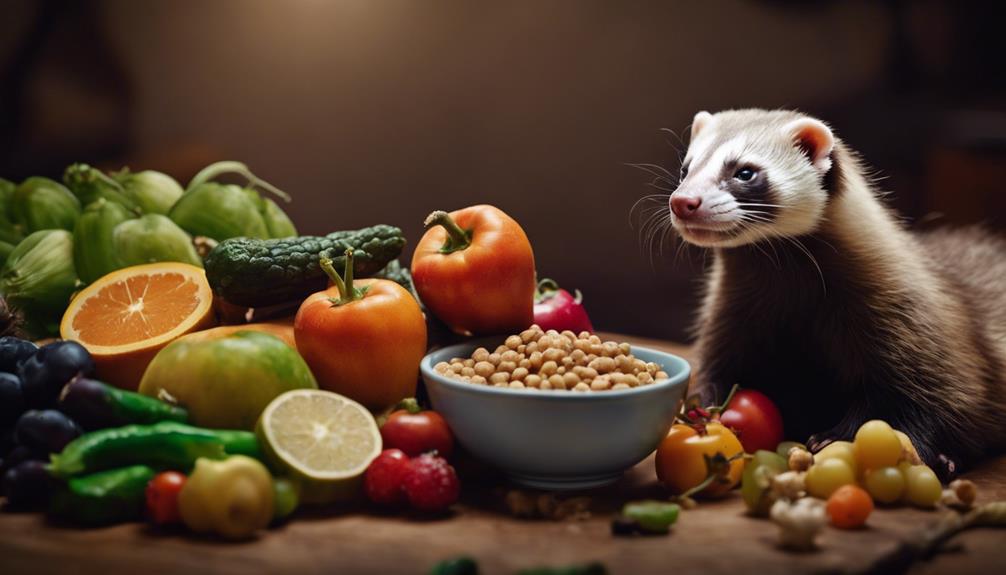How to Identify Nutritional Gaps in Your Ferret's Diet

When evaluating your ferret's diet, consider factors such as their age, activity level, and health status. Look for signs of nutritional deficiencies, such as dull coat, weight loss, or lethargy. Keep a food diary to track what they eat and identify any gaps in their diet. Consult with a veterinarian or a ferret nutrition specialist for guidance on selecting appropriate commercial ferret food or supplementing their diet with homemade food. Regularly monitor your ferret's body condition and adjust their diet as needed to meet their changing nutritional requirements.
By understanding your ferret's unique nutritional needs and taking proactive steps to address any gaps in their diet, you can help ensure that they enjoy a long, healthy, and happy life. Remember that proper nutrition is essential for your ferret's overall well-being, so investing time and effort in evaluating and enhancing their diet is a vital aspect of responsible ferret ownership.
Understanding Ferret Nutritional Requirements
Understanding the nutritional requirements of ferrets is essential for ensuring their optimal health and well-being. Ferrets have a unique digestive system characterized by a short gastrointestinal tract, fast transit time, and a high metabolic rate. Due to this, they require a diet that's rich in animal-based proteins, moderate in fats, and low in carbohydrates.
Balanced meal planning is crucial to provide the necessary nutrients for ferrets. A proper diet should consist of high-quality commercial ferret food or a mix of whole prey items like mice, rats, or chicks. It's important to avoid feeding them dog or cat food as these don't meet the specific nutritional needs of ferrets. Additionally, treats should be given sparingly to prevent dietary imbalances.
Signs of Nutritional Deficiencies

Ferrets that exhibit signs of nutritional deficiencies may display visible changes in their coat quality, energy levels, and overall health. It's essential for ferret owners to be aware of these signs to ensure the health and well-being of their pets.
Some common indicators of nutritional deficiencies in ferrets include:
- Behavior changes: Nutritional gaps can lead to alterations in a ferret's behavior, such as increased lethargy or irritability.
- Weight loss: Unexplained weight loss despite a regular diet can be a sign of inadequate nutrition.
- Dull coat: A lack of essential nutrients may manifest in a dull, unkempt fur coat that lacks its usual luster.
- Digestive issues: Nutritional deficiencies can result in digestive problems like diarrhea or constipation.
- Overall poor health: Ferrets experiencing nutritional gaps may show a decline in their overall health, including reduced immunity and vitality.
Observing these signs promptly and addressing any potential deficiencies through appropriate dietary adjustments is crucial for maintaining a healthy and happy ferret.
Common Nutritional Gaps in Ferrets

Ferrets commonly experience nutritional gaps in their diet, particularly in meeting their protein needs, essential fatty acids, and vitamin requirements.
Protein is crucial for ferrets as they're obligate carnivores, needing a high-protein diet for optimal health.
Essential fatty acids play a vital role in maintaining the skin, coat, and overall well-being of ferrets.
Meeting their specific vitamin requirements is essential for preventing deficiencies and ensuring their overall nutritional balance.
Protein Needs
A crucial aspect in ensuring optimal health for these small carnivores is meeting their high protein requirements. Ferrets require a diet rich in animal-based proteins to thrive due to their carnivorous nature. When considering protein needs for ferrets, it's essential to evaluate the protein sources and their digestibility factors carefully.
- Protein sources: Ferrets benefit most from protein derived from animal sources such as meat, poultry, and fish.
- Digestibility factors: Ensuring the proteins in their diet are highly digestible aids in meeting their nutritional needs efficiently.
- Balance: A well-rounded diet should contain a variety of protein sources to provide a spectrum of essential amino acids.
- Freshness: Fresh, high-quality protein sources are vital for maintaining the health and well-being of ferrets.
- Quantity: Adequate protein intake is crucial to support their energy levels, muscle development, and overall health.
Essential Fatty Acids
Ensuring an adequate intake of essential fatty acids is crucial for meeting the nutritional needs of these small carnivores. Ferrets require a balanced intake of Omega 3 and Omega 6 fatty acids for optimal health. Omega 3 benefits include supporting heart health, reducing inflammation, and promoting a shiny coat.
Sources rich in Omega 6, such as poultry fat, canola oil, and sunflower oil, contribute to the overall well-being of ferrets. Healthy fats are essential for energy production, cell structure, and hormone regulation in these animals.
To prevent nutritional gaps, ferret owners should provide a diet that includes a variety of protein sources along with the appropriate balance of essential fatty acids.
Vitamin Requirements
Meeting the vitamin requirements is crucial for addressing common nutritional gaps in the diet of ferrets. Ensuring balanced nutrition through dietary variety is essential to meet their vitamin needs. Here are some key points to consider:
- Dietary supplements: Provide ferrets with quality vitamin supplements to complement their diet.
- Vitamin sources: Include vitamin-rich foods such as organ meats and eggs in their meals.
- Balanced nutrition: Opt for commercial ferret food that's specifically formulated to meet their vitamin requirements.
- Dietary variety: Rotate different protein sources and vegetables to ensure a diverse nutrient intake.
- Consult a vet: Regularly consult with a veterinarian to assess your ferret's diet and vitamin needs.
Importance of High-Quality Diet

A high-quality diet is essential for a ferret's overall health and well-being.
The impact of diet quality on a ferret's health can't be overstated, as it directly affects their nutrient intake and overall bodily functions.
Neglecting to provide a high-quality diet can lead to nutrient deficiencies, compromising the ferret's health and longevity.
Diet Quality Impact
High-quality diet plays a crucial role in ensuring optimal health and well-being for ferrets. Ferrets, like all animals, require a balanced and varied diet to thrive. Here are key points emphasizing the impact of diet quality:
- Nutritional Balance: A high-quality diet ensures that ferrets receive all essential nutrients in the right proportions.
- Dietary Variety: Offering a variety of foods helps prevent nutrient deficiencies and promotes overall health.
- Health Implications: Poor diet quality can lead to various health issues such as obesity, malnutrition, and digestive problems.
- Feeding Practices: Consistent access to fresh water and feeding appropriate portion sizes are crucial for maintaining a high-quality diet.
- Physical Well-being: A high-quality diet supports a ferret's immune system, energy levels, and overall quality of life.
Nutrient Deficiency Risks
Ensuring a diverse range of nutrients in a ferret's diet is vital to prevent deficiencies that can impact their overall health and well-being significantly. Nutrient absorption plays a crucial role in maintaining a ferret's health, and a balanced diet is essential for this process.
A diet lacking in essential nutrients can lead to various deficiencies, such as vitamin deficiencies, which can result in serious health issues for ferrets. Without a balanced diet, ferrets may experience problems with digestion, energy levels, and overall growth and development.
It's imperative for ferret owners to provide high-quality food that meets all their nutritional needs to prevent the risks associated with nutrient deficiencies. By prioritizing a well-rounded diet, ferret owners can support their pets' health and well-being effectively.
Seeking Veterinary Advice

When seeking veterinary advice for your ferret's nutritional needs, it's essential to consult a veterinarian experienced in exotic pet care. These professionals can provide expert advice on dietary consultation and nutritional assessment specific to your ferret's requirements.
Here are some key points to consider when seeking veterinary advice:
- Specialization: Ensure the veterinarian has experience with ferrets or exotic pets.
- Nutritional Assessment: Request a thorough evaluation of your ferret's current diet.
- Customized Diet Plan: Ask for a personalized diet plan tailored to your ferret's age, health status, and activity level.
- Supplement Recommendations: Inquire about any necessary supplements to fill potential nutritional gaps.
- Follow-Up: Discuss a follow-up schedule to monitor your ferret's progress and make any necessary adjustments.
Supplementing Your Ferret's Diet

To ensure your ferret receives essential nutrients, incorporating supplements into its diet according to your veterinarian's recommendations is crucial. Dietary supplements play a vital role in providing balanced nutrition for your ferret. These supplements are designed to fill any nutritional gaps that may be present in their regular diet, ensuring they receive all the necessary vitamins and minerals for optimal health.
When selecting dietary supplements for your ferret, it's important to consult with your veterinarian to determine which ones are most suitable for your pet's specific needs. Common supplements for ferrets may include those containing essential fatty acids, vitamins such as A, D, and E, as well as minerals like calcium and phosphorus.
It's crucial to follow the recommended dosage guidelines provided by your veterinarian to prevent over-supplementation, which can be harmful to your ferret. By incorporating the right dietary supplements into your ferret's diet, you can help ensure they're receiving a well-rounded and balanced nutrition plan tailored to their individual requirements.
Monitoring and Adjusting Diet Regularly

Regular monitoring and adjustment of your ferret's diet is essential to maintain their optimal health and nutrition. To ensure your ferret is getting all the necessary nutrients, regular diet analysis and adjustments are crucial. Here are some key points to consider:
- Observe Ferret's Body Condition: Regularly assess your ferret's body condition to ensure they're at a healthy weight.
- Consult with a Veterinarian: Seek advice from a veterinarian to determine if any dietary changes are needed.
- Monitor Food Intake: Keep track of the amount of food your ferret consumes to adjust portion sizes accordingly.
- Check for Nutrient Balance: Ensure that your ferret's diet provides a proper balance of proteins, fats, vitamins, and minerals.
- Observe Changes in Behavior: Monitor your ferret's behavior and energy levels, as these can indicate if their diet needs adjustments.
Frequently Asked Questions
Can Ferrets Eat Fruits and Vegetables as Part of Their Diet?
Ferrets find fruits and veggies appetizing additions to their diet. Ferret friendly fruits offer natural sweetness while a vegetable variety provides essential nutrients. Introduce these foods gradually and monitor for any digestive issues to ensure a balanced diet.
How Can I Ensure My Ferret Is Getting Enough Hydration in Their Diet?
To ensure a ferret gets adequate hydration, provide fresh water at all times and consider offering wet ferret food. Monitoring water intake is crucial. Hydration sources like water bottles or bowls should be easily accessible.
Are There Any Specific Vitamins or Minerals That Ferrets Are More Prone to Being Deficient In?
Ferrets may be prone to deficiencies in certain vitamins and minerals like taurine, which is crucial for their heart health. Nutritional supplements can help maintain dietary balance to ensure optimal nutrient absorption and overall ferret health.
How Should I Introduce New Foods Into My Ferret's Diet to Prevent Digestive Issues?
When introducing new foods into a ferret's diet to maintain digestive health, it's crucial to ensure a balanced diet. Slowly transition foods over several days. Monitor for any signs of digestive issues like diarrhea or vomiting.
Are There Any Specific Feeding Schedules or Meal Plans That Are Recommended for Ferrets?
In establishing a balanced diet for ferrets, feeding frequency plays a pivotal role. It is recommended to offer a variety of foods to promote nutrient absorption. Portion control can aid in preventing overeating, ensuring a well-rounded dietary intake.











